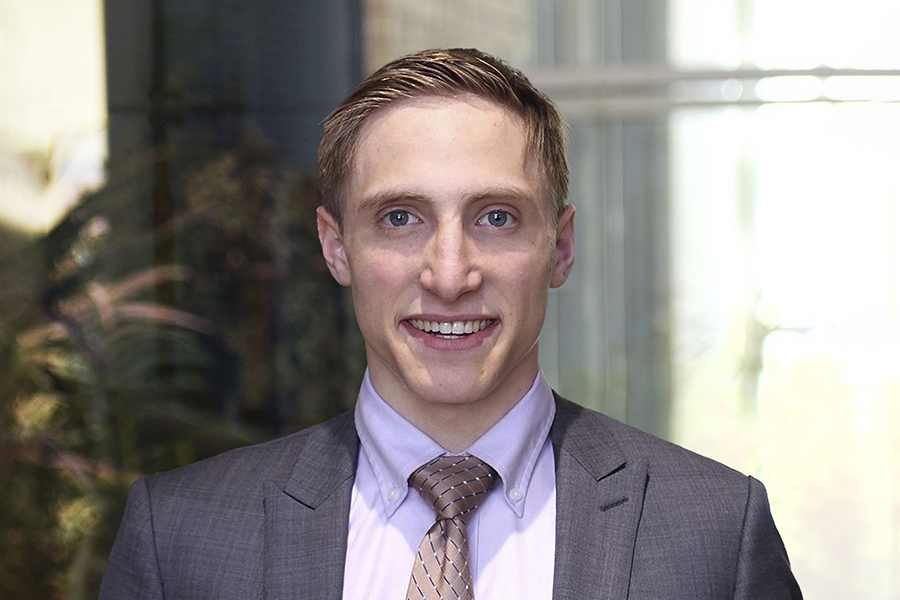
Up for Debate
Dietrich College alumnus’s love of discourse and democracy leads to Harvard Law School
By Kristy Locklin
For Associate Professor of Science, Technology and Society Jay Aronson and Greg Volynsky, a 2020 Dietrich College of Humanities and Social Sciences graduate, some of the most interesting lessons happened in the hallways of Baker Hall.
“Greg was in my History of American Public Policy class and we had a number of conversations while walking to my office,” Jay recalls. “I really enjoy students who are so clearly engaged in what I’m doing in the classroom and who push back, rethink and argue about other ways of interpreting things to piece together solutions.”
Even as a kid, Greg was eager to pick the brains of great thinkers. When he was age 10, he sent an email to researchers at MIT to learn about 3D printers. A post-doctoral student, perhaps not realizing Greg’s age, responded with all sorts of high-tech information.
“I still feel like everything I do is to further my education,” Greg says. “It’s not an end in and of itself; it’s a means.”
Greg, who earned a degree in behavioral economics, policy and organization at Carnegie Mellon University, will attend Harvard Law School in the fall. He took an unexpected pandemic gap year to do research for the Pennsylvania Prison Society, an organization that advocates for humane treatment of inmates, and is currently working for the Japanese consulate, learning how local and state politics converge with international diplomacy.
His parents emigrated from Ukraine in 1997, two years before he was born. He grew up hearing stories about atrocities in the USSR and developed a sense for the way in which law can create justice from injustice and opportunity from poverty.
"I don’t know exactly what he’s going to do, but I can predict he’s going to be doing really important things and making positive impacts on people’s lives."
Jay Aronson,
Associate Professor of Science, Technology and Society
A near-lifelong attempt to grapple with the psychology that motivated Soviet totalitarianism and German fascism lead Greg to CMU. The school’s undergraduate behavioral economics program, the first in the country, combined his love of statistics, social science and research.
“My thesis is an empirical study of the formation of ‘authoritarian attitudes’ — in essence, how the individual attitudinal component of authoritarian politics develops,” he says.
During his time at CMU, Greg attended a summer program in Israel, where he was one of 44 Americans selected for the prestigious Israel Excel business program and one of 10 selected for an all-expenses-paid pre-incubator program, Birthright Excel Ventures. Together with three team members, Greg built the foundation for a tech startup that seeks to enable companies to send interactive emails, creating a web-like email experience for the consumer and increasing email marketing conversion for the company.
While on campus, he started a debate club for middle and elementary school children, Carnegie Debate, through the Swartz Center for Entrepreneurship.
Carnegie Debate continues to provide a space where kids ages 10 to 16 can speak their minds and see the power of perspective. Participants tackle all sorts of subjects, from politics to whether violent video games should be more heavily regulated.
“When I teach debate to kids, it ties back to this idea that a healthy public discourse is democracy,” says Greg, who started debating when he was in ninth grade. “And this, too, is why I want to go to law school: law in America is the way we — however narrow and unjust the definition of ‘we’ has historically been and presently is — self-organize. This public sphere, which did not exist in the reality in which my parents grew up, provides hope that we can create a more just, peaceful and better world.”
Jay is proud of his former student and sees him getting involved in criminal justice at a big-picture policy level.
“I don’t know exactly what he’s going to do, but I can predict he’s going to be doing really important things and making positive impacts on people’s lives,” Jay says.